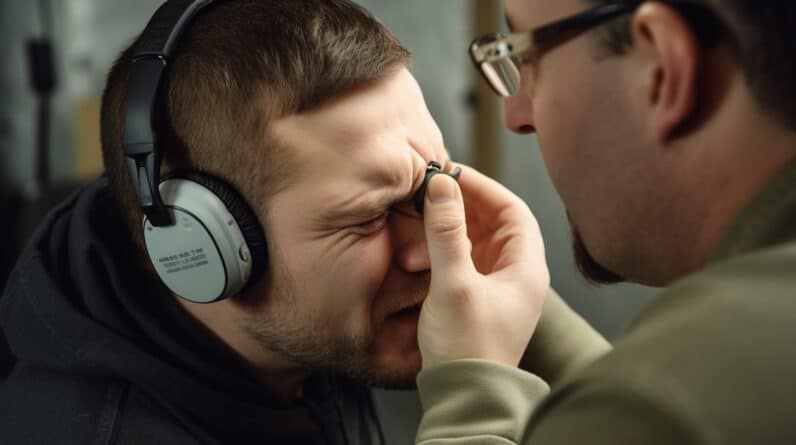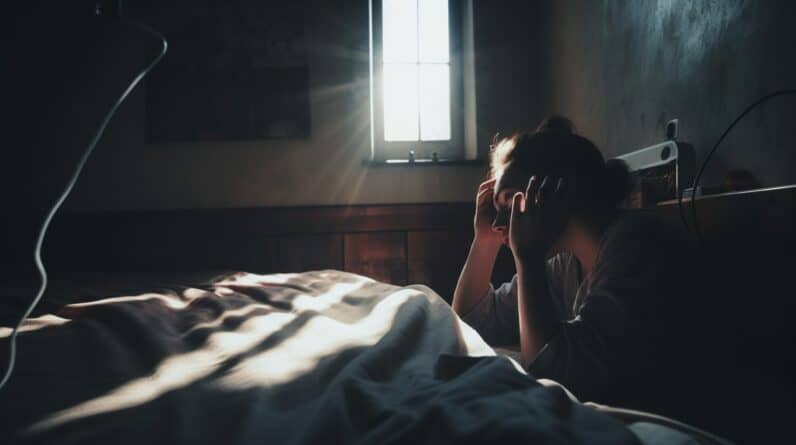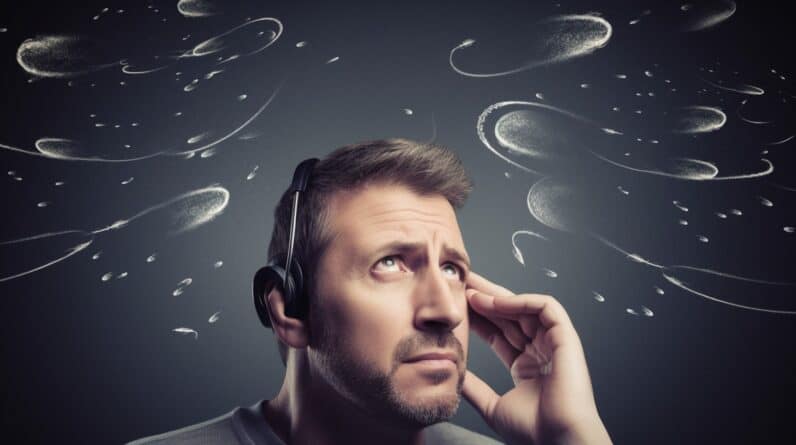
We may earn money or products from the companies mentioned in this post.
As an Amazon Associate I earn from qualifying purchases.
Introduction
If you’ve ever been to a gun range or have shot a firearm, you know the loud noise produced by the gunshot can be overwhelming. With such loud noises, protecting your hearing is absolutely crucial. Overlooking this detail can result in tinnitus, a ringing or buzzing noise in the ears that can severely affect a person’s life. In this article, we’ll discuss the causes of ear ringing after shooting a gun, and how to prevent it by using the appropriate protective measures.
Causes of Ear Ringing After Shooting Gun
Acoustic trauma and its effects on the auditory system
Loud noises, like gunshots, can cause acoustic trauma. Acoustic trauma occurs when sound waves damage the delicate structures inside the ear, resulting in temporary or permanent hearing problems, including tinnitus. The damage is often due to the excessive sound pressure that overwhelms the ears’ natural defense mechanisms.
Damage to the delicate structures of the inner ear
The inner ear contains tiny hair cells responsible for transmitting sound signals to the brain. Prolonged exposure to loud sounds, such as gunshots, can damage these hair cells, leading to hearing problems and tinnitus. Once damaged, these hair cells cannot regenerate, which may result in permanent hearing issues.
Factors that can increase the risk of tinnitus after shooting
Several factors can increase the risk of developing tinnitus due to shooting guns:
- Gun type: High-caliber firearms produce louder noises and can, therefore, cause more hearing damage.
- Proximity: Being closer to the sound source increases the likelihood of acoustic trauma.
- Frequency of exposure: Regular, repeated exposure to gunshots without proper hearing protection will damage the ears over time.
Preventing Ear Ringing After Shooting: Protective Measures
Using proper hearing protection
To prevent tinnitus and other hearing problems, wearing the correct hearing protection is essential. Earplugs and earmuffs specifically designed for gun users offer optimal protection against dangerous sounds.
Understanding the Noise Reduction Rating (NRR) system
The Noise Reduction Rating (NRR) is an index that measures the effectiveness of hearing protection devices. A higher NRR indicates better noise reduction. When choosing earmuffs or earplugs, opt for those with a high NRR to ensure your ears are well-protected while shooting.
Selection of suitable earplugs and earmuffs for shooting activities
Several types of earplugs and earmuffs are available for shooters. Some of the most popular options include:
- Foam earplugs: Inexpensive and disposable, foam earplugs offer a practical and straightforward solution for those who shoot guns occasionally.
- Reusable earplugs: Made of silicone or rubber, reusable earplugs can be cleaned and used multiple times. These provide a more environmentally-friendly option than disposable ones.
- Electronic earmuffs: These advanced devices offer excellent noise reduction by amplifying low sounds and attenuating loud noises, ensuring the user’s hearing is protected while still being aware of their surroundings.
It is essential to choose hearing protection suitable for your specific needs and preferences to avoid tinnitus and other ear-related problems after shooting firearms.
Immediate Relief and First Steps After Ear Ringing
Seeking quiet environments to reduce stress on ears
If you notice a ringing sound in your ears after shooting, one of the first steps to take is to move to a quiet environment as soon as possible. Reducing the auditory input to your ears can help alleviate the ringing and give your ears a chance to rest and recover.
OTC medications that may provide temporary relief
Some over-the-counter (OTC) medications, like ibuprofen or acetaminophen, can potentially provide temporary relief from ear pain associated with tinnitus. However, these medications should be used with caution and only as directed on the label. It’s also essential to remember that OTC medications may only provide short-term relief, and addressing the root cause of the tinnitus is necessary for a long-lasting solution.
When to consult a healthcare professional
If the ringing in your ears persists for more than a few hours, it may be time to consult a healthcare professional. A doctor or audiologist can perform a comprehensive evaluation of your hearing and recommend appropriate treatment options based on the severity and underlying cause of your tinnitus.
Potential Treatments for Tinnitus After Shooting
Sound therapy, including masking devices and hearing aids
Sound therapy is a common treatment option for tinnitus sufferers. It involves using sound to mask or distract from tinnitus. Masking devices, like white noise machines, produce soothing sounds that can help drown out the ringing. Hearing aids can also be beneficial for individuals with hearing loss and tinnitus, as they amplify desired sounds while minimizing the perception of tinnitus.
Counseling and cognitive-behavioral therapy
Counseling and cognitive-behavioral therapy (CBT) can help individuals cope with tinnitus more effectively by addressing the emotional and mental impact of the condition. CBT helps patients identify and change negative thought patterns related to tinnitus, ultimately reducing the distress and anxiety associated with the ringing in their ears.
Medications to alleviate symptoms (e.g., anti-anxiety drugs, antidepressants)
In some cases, medications like anti-anxiety drugs or antidepressants may be prescribed to help reduce tinnitus symptoms. They work by targeting the parts of the brain responsible for stress and anxiety, which can exacerbate tinnitus symptoms. However, medications are not typically the first line of treatment for tinnitus and should only be used under the supervision of a healthcare professional.
Lifestyle changes to reduce tinnitus symptoms
Incorporating lifestyle changes can also help manage tinnitus symptoms. Some positive changes include stress management techniques (e.g., deep breathing exercises, meditation), maintaining a healthy diet, exercising regularly, and avoiding excessive caffeine and alcohol consumption. These changes can improve overall well-being and potentially lessen the impact of tinnitus on daily life.
Long-term Management and Coping Strategies
Maintaining healthy hearing habits
In order to prevent future episodes of tinnitus and preserve your hearing, it’s essential to maintain healthy hearing habits. This includes scheduling regular checkups with a healthcare professional, always using hearing protection when exposed to loud noises (such as during shooting activities), and being mindful of the volume when listening to music or engaging in other activities that involve loud sounds.
Support groups and resources for tinnitus sufferers
Living with tinnitus can be challenging, but you don’t have to face it alone. There are many support groups, online forums, and resources available to help you connect with others who are coping with tinnitus. Sharing your experiences and learning from others can provide valuable insights and encouragement as you navigate life with tinnitus.
Managing mental health aspects of living with tinnitus
Tinnitus can take a toll on your mental health, sometimes leading to anxiety, depression, or sleep disturbances. It’s important to acknowledge and address these challenges. Consider seeking professional counseling or therapy if you’re struggling with the emotional and mental aspects of living with tinnitus. Additionally, incorporating stress-reduction techniques such as meditation, mindfulness, and relaxation exercises into your daily routine can help improve your overall well-being and increase your ability to cope with tinnitus.
Conclusion
Ear ringing after shooting a gun can be a distressing and unpleasant experience, but with proper hearing protection and prompt action following exposure to loud noises, it can be prevented or managed. By utilizing the strategies and treatments discussed in this article, you can effectively cope with tinnitus and protect your hearing for years to come. Remember to always prioritize your hearing health, seek support from professionals and peers when needed, and take proactive steps to maintain a good quality of life despite tinnitus.
Ear Ringing After Shooting Gun - Frequently Asked Questions
Ear ringing after shooting a gun is often caused by acoustic trauma, which occurs when the dangerously loud noise generated by gunshots damages the delicate structures within the inner ear. This can lead to temporary or permanent hearing issues, including tinnitus, a ringing or buzzing noise in the ears.
To prevent ear ringing after shooting, it is essential to use proper hearing protection, such as earplugs or earmuffs specifically designed for shooting activities. Choose protection with a high Noise Reduction Rating (NRR) to ensure optimal noise reduction during shooting.
If you experience tinnitus after shooting, seek a quiet environment to reduce stress on your ears, allowing them to rest and recover. If the ringing persists for more than a few hours, consult a healthcare professional for a comprehensive evaluation and appropriate treatment options.
Treatment options for tinnitus caused by shooting include sound therapy, which uses masking devices or hearing aids to reduce the perception of tinnitus; counseling and cognitive-behavioral therapy to address the emotional and mental impact of the condition; and medications like anti-anxiety drugs or antidepressants to alleviate symptoms, under the supervision of a healthcare professional. Additionally, incorporating lifestyle changes and stress-management techniques can help manage tinnitus symptoms.
Long-term strategies to cope with tinnitus caused by shooting involve maintaining healthy hearing habits, such as regular checkups and continued use of hearing protection; seeking support from tinnitus sufferers through support groups and resources; and managing the mental health aspects of living with tinnitus. Practice stress reduction techniques, seek professional counseling if necessary, and prioritize hearing health to effectively manage tinnitus symptoms.
Amazon and the Amazon logo are trademarks of Amazon.com, Inc, or its affiliates.
Related posts:
- Silencing the Noise: Your Ultimate Guide to Overcome Ear Ringing Can’t Hear and Regaining Hearing
- Unlocking the Secrets of Ear Pain and Ringing: Comprehensive Guide to Causes, Symptoms, and Breakthrough Relief Strategies
- Ear Ringing and Ear Pain: Your Ultimate Guide to Diagnosis and Treatment
- The Unseen Connection: How Congestion Leads to Ear Ringing and How to Combat It









1 Comment